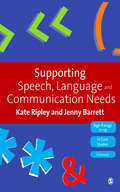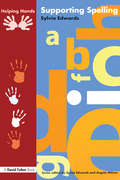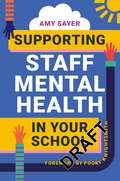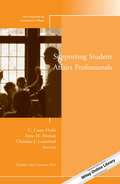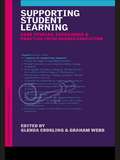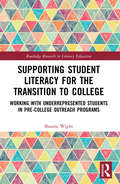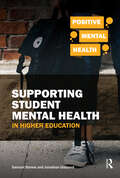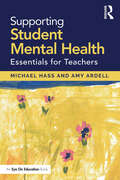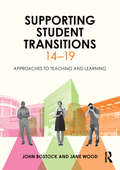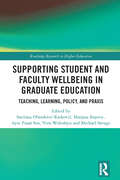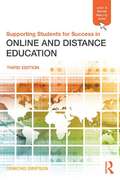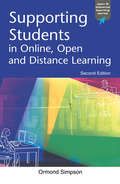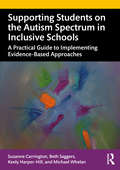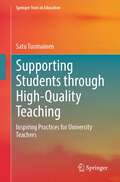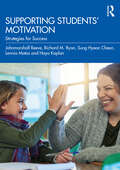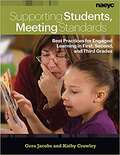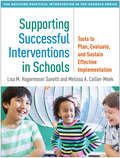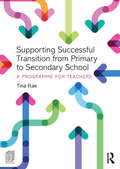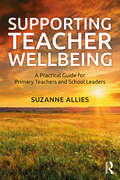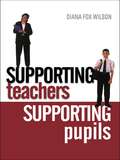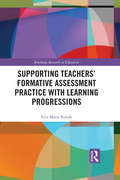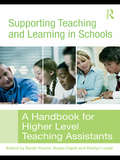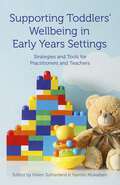- Table View
- List View
Supporting Speech, Language & Communication Needs: Working with Students Aged 11 to 19
by Jenny Barrett Kate RipleyDesigned for all those who support older children and young adults with speech and language difficulties, this resource provides ideas, practical strategies and detailed information about the speech, language and communication needs (SLCN) of older students. Both authors have over 20 years experience of delivering courses to teachers, Special Needs Co-ordinators (SENCOs) and Specialist Outreach teachers in different local authorities, further education colleges and university departments. Kate Ripley is an Educational Psychologist, trainer and national and international conference speaker on themes related to speech, language and communication needs. Jenny Barrett is a Speech and Language Therapist with internationally recognised expertise in her field, who now works as a freelance consultant.
Supporting Spelling (Helping Hands)
by Sylvia EdwardsSylvia Edwards' book concentrates on enhancing the spelling skills of the pupils whom you support; analyzing how you can develop their spelling skills, offering advise and guidance on a variety of learning styles, and a breakdown of spelling principles.
Supporting Staff Mental Health in Your School
by Amy SayerThis is an accessible guide for schools explaining how to implement effective techniques to improve staff mental health. Drawing on case studies from years of experience supporting staff mental health, Amy Sayer introduces inexpensive, practical and realistic strategies that schools can implement to ensure the mental wellbeing of teaching staff.This book provides steps to ensure that self-care and family time do not slip under the radar in the face of increasing pressure and limited resources. From providing adequate staff room facilities to ensuring that teachers can set clear boundaries around weekends and break times, these ideas create and foster a culture of openness around mental health and help teachers to re-discover their love of teaching.
Supporting Student Affairs Professionals: New Directions for Community Colleges, Number 166 (J-B CC Single Issue Community Colleges)
by C. Casey Ozaki Anne M. Hornak Christina J. LuncefordStudent affairs and services play a critical role in student learning and success, as well as the level at which community colleges meet institutional outcomes. The evolution of student affairs as a field and recognition of its role in student experiences underscore its importance in the effort to provide qualityeducation to college students. This volume provides a framework for excellence in student affairs work at community colleges, including assessing quality and outcomes for program development and accreditation. The authors explore: Excellence in preparing and developing professionals at multiple stages in their careers Creating and using professional standards and competencies Understanding the role of accreditation in professional practice. The issue also includes a discussion of implications for community college student affairs preparation and practice.This is the 166th volume of this Jossey-Bass quarterly report series. Essential to the professional libraries of presidents, vice presidents, deans, and other leaders in today's open-door institutions, New Directions for Community Colleges provides expert guidance in meeting the challenges of their distinctive and expanding educational mission.
Supporting Student Diversity in Higher Education: A practical guide
by Michelle MorganSupporting Student Diversity in Higher Education is a working manual that is designed to help managers, academics and members of the professional service teams within universities, recruit and support a diverse student body across the student lifecycle at the same time as delivering a quality student experience in a challenging and pressured enviro
Supporting Student Learning: Case Studies, Experience and Practice from Higher Education (Case Studies Of Teaching In Higher Education)
by Graham Webb Glenda CroslingThis volume focuses on the support programmes that all higher education establishments have in place to aid and develop student learning. The work is designed to equip HE professionals with an accessible guide to some of the best practices in this field from around the world.
Supporting Student Literacy for the Transition to College: Working with Underrepresented Students in Pre-College Outreach Programs (Routledge Research in Literacy Education)
by Shauna WightFocusing on the needs and experiences of underrepresented students in the US, this text explores how pre-college outreach programs can effectively support the development of students’ writing skills in preparation for the transition from high school to college. Synthesizing data from a longitudinal study focusing on multilingual, low-income, and first-generation students, this volume provides in-depth exploration of the strategies and resources used in a pre-college literacy program in the US. Grounded in an expansive, qualitative study, chapters reveal how outreach practices can encourage student-led research, writing, confidence, and collaboration. More broadly, programs are shown to help tackle issues of inequality, increase college readiness, and reduce difficulties with writing which can restrict minority students’ access to higher education and their longer-term college attainment. This text will benefit researchers, academics, and educators with an interest in English and literacy studies, multicultural education, and pre-college writing instruction. Those interested in bilingualism, translingualism, writing studies, English as a second language (ESL), and applied linguistics will also benefit from the volume.
Supporting Student Mental Health in Higher Education
by Jonathan Glazzard Samuel StonesStudent mental health is a key consideration in higher education at the moment with recent reports identifying a major gap in provision by universities and how ill-equipped academics feel to support students. This book addresses these concerns, providing comprehensive guidance and workable evidence-informed strategies and interventions to help those working with students to support them effectively. It is suitable for lecturers, personal tutors, student counsellors, course leaders, heads of department and administration staff with responsibility for student support.
Supporting Student Mental Health: Essentials for Teachers
by Michael Hass Amy ArdellSupporting Student Mental Health is a guide to the basics of identifying and supporting students with mental health challenges. It’s no secret that your responsibilities as a teacher go beyond academic achievement. You cover key socioemotional competencies in your classrooms, too. This book is full of accessible and appropriate strategies for responding to students’ mental health needs, such as relationship-building, behavioral observation, questioning techniques, community resources, and more. The authors’ public health, prevention science, and restorative practice perspectives will leave you ready to run a classroom that meets the needs of the whole child while ensuring your own well-being on the job.
Supporting Student Transitions 14–19: Approaches to teaching and learning
by Jane Wood John BostockSupporting Student Transitions 14-19 offers transition focused approaches to planning, teaching, learning and assessment designed to meet the needs of these unique learners. Drawing upon the latest research and theory, as well as the authors’ extensive experience in the field, it examines in detail transitions in teaching and learning in this complex sector. Drawing out and critically analysing the key features of both pedagogy and andragogy, the book presents the best elements of each to provide all tutors and practitioners involved in the teaching of 14-19 learners with clear strategies for supporting this group. Practical advice backed by sound theory will provide readers with a clear understanding of the requirements and needs of learners in the school, college and university. Topics explored include: ???? The role of the teacher in supporting student transitions ???? Understanding transition focused approaches Emotional and social factors involved ????Recognising difficulties and helping students prepare Supporting Student Transitions 14-19 is a practical guide also offering a unique contribution to the discourse on this important sector of education, increasingly afforded the attention it deserves. It will be an essential resource for trainee teachers, students of PCET, lecturers and teachers wanting to build upon their understanding of this group of learners.
Supporting Student and Faculty Wellbeing in Graduate Education: Teaching, Learning, Policy, and Praxis (Routledge Research in Higher Education)
by Michael Savage Mirjana Bajovic Ayse Pinar Sen Vera Woloshyn Snežana Obradović-RatkovićSupporting Student and Faculty Wellbeing in Graduate Education recognizes new pressures impacting graduate students and their supervisors, teachers, and mentors globally. The work provides a range of insights and strategies which reflect on wellbeing as an integral part of teaching, learning, policy, and student-mentor relationships. The authors offer a uniquely holistic approach to supporting the wellbeing of both students and academic staff in graduate education. The text showcases optimized approaches to self-care, self-regulation, and policy development, as well as trauma-informed, arts-based, and embodied pedagogies. Particular attention is given to the challenges faced by minority groups including Indigenous, international, refugee, and immigrant students and staff. Providing a timely analysis of the current issues surrounding student and faculty wellbeing, this volume will appeal to scholars and researchers working across the fields of higher education, sociology of education, educational psychology, and student affairs.
Supporting Students for Success in Online and Distance Education: Third Edition
by Ormond SimpsonSupporting Students for Success in Online and Distance Learning, Third Edition, provides a comprehensive overview of student support both on and off campus. While online and distance learning are the world’s fastest growing areas of educational development, they have a fundamental weakness—their graduation rates, which can be lower than 20 percent. In this powerful new edition, Ormond Simpson builds on a rich history of research in distance and e-learning to show how retention rates can be improved through tested support methods, often at a net financial profit to the institutions involved. By comparing the evidence as well as the cost-effectiveness of various support tactics, this book describes how to promote student success and encourage skill-development from a number of different perspectives: definitions and purpose, theory and psychology, ethics, costs and benefits, activities, sources, media, proactive and reactive, assessment and feedback, staff development, writing support into course materials, research, quality assurance and institutional structures. This concise, practical guide is informal and jargon-free, yet its approach to evidence is rigorous, making it invaluable reading for all those interested in recruiting and teaching diverse students for successful online and distance learning.
Supporting Students in Online Open and Distance Learning (Open and Flexible Learning Series)
by Ormond SimpsonThis new addition to the respected Open and Distance Learning Series is an up-to-the-minute guide for educators wanting to come to terms with their support role in open and distance learning. Covering all aspects of student support from tuition and counselling through to the broad range of delivery methods available, the book offers practical solutions that are set within a sound theoretical framework.
Supporting Students in Online, Open and Distance Learning (Open and Flexible Learning Series)
by Ormond SimpsonRecognized as the leading book on the subject, Supporting Students in Online, Open and Distance Learning considers the support of students either on or off-campus. Ever-greater numbers of students are studying as part of open, flexible, distance or online courses and, with the rise in numbers and expectations, so the need to offer these often-diverse students effective support is critical.Fully revised and expanded, this new edition reflects current concerns and developments in ODL. It includes increased coverage of tuition in different media, issues of student retention, structures and quality assurance, staff development, online support and computer conferencing. Practical and authoritative, the book tackles the full range of student support issues in ODL, including:*developing the most appropriate tuition techniques*social support*retention*delivering support at a distance and online*face-to-face support*learning-skills and staff developmentSupporting Students in Online, Open and Distance Learning is essential reading for all those with an interest in recruiting and teaching students in open and distance learning or e-learning situations. It will help lecturers, moderators and tutors to develop a range of skills with a focus on support, retention and student outcomes.
Supporting Students on the Autism Spectrum in Inclusive Schools: A Practical Guide to Implementing Evidence-Based Approaches
by Michael Whelan Keely Harper-Hill Suzanne Carrington Beth SaggersInclusive education has grown as an international movement to not only support students with disabilities but also promote equitable access, participation, and success for all students. This book will transform the capacity of teachers and specialists working with students and families to effectively support an inclusive approach to education for students on the autism spectrum. This book addresses the urgent need to identify inclusive educational environments and strategies for students on the autism spectrum so that they have the best chance of social, behavioural, and academic success at school. Teachers who include students on the autism spectrum in primary and secondary classrooms require greater knowledge of how they can best support the learning, social, and behavioural needs of their students. Without such knowledge, the consequences can include unsatisfactory learning experiences for all students, and interrupted schooling for the student on the autism spectrum through reduced attendance and retention, lower academic performance, exclusion, disengagement, and pressure on parents to make alternative arrangements for their child’s education. Inclusive education is socially, emotionally, and academically beneficial for all students and positively impacts on respectful attitudes to difference. This book presents innovative, evidence-based practices that will build the capacity of teachers and specialists implementing an inclusive and contextually relevant approach to education that will support students on the autism spectrum and meet the diverse needs of all students in their classrooms.
Supporting Students through High-Quality Teaching: Inspiring Practices for University Teachers (Springer Texts in Education)
by Satu TuomainenThis book provides a Finnish perspective on high-quality teaching in higher education and explores Finnish approaches on teaching, learning and supporting students. It addresses the concepts of quality in teaching, teaching excellence and effective teaching in today’s higher education in which the student body has become increasingly international and heterogenous. The book discusses how the role of the teacher has changed from authority to facilitator in the past decades while many students still value their university experience based on the teachers they encounter. The book provides a practitioner view on how students can be supported through communication, compassion and expertise and how professional and pedagogical development are essential for high-quality teaching in an increasingly competitive, diverse and online world of higher education. The book introduces the principles of Finnish higher education and universities, and the Finnish education system in connection with the approach to teaching, teacher education and the highly valued profession of a teacher. What is good teaching in higher education? It can consist of the learning environment, the location, the students and the teacher, and many studies show that effective, compassionate, skilled and humanist teachers will leave their mark on students. It is also equally important for teachers to invest in pedagogical training and conduct research on teaching practices, experiments and students’ perceptions as part of professional development. International classrooms also require specific considerations, as does online learning. The COVID-19 pandemic forced a substantial transfer to online and blended learning in higher education, but can quality teaching exist online, or have we passed the baton to students to be in charge of their learning, to study even more independently?
Supporting Students' Motivation: Strategies for Success
by Richard M. Ryan Johnmarshall Reeve Sung Hyeon Cheon Lennia Matos Haya KaplanThis is a book about teachers’ classroom motivating styles. Motivating style is the interpersonal tone and face-to-face behavior the teacher relies on when trying to motivate students to engage in classroom activities and procedures. The over-arching goal of the book is to help teachers work through the professional developmental process to learn how to provide instruction in ways that students will find to be motivationally-enriching, satisfying, and engagement-generating. To realize this goal, the book features six parts: Part 1: Introduction, introduces what teachers are to support—namely, student motivation; Part 2: Motivating Style, explains what a supportive motivating style is; Part 3: “How to,” overviews the recommended motivationally-supportive instructional strategies one-by-one and step-by-step; Part 4: Workshop, walks the reader through the skill-building workshop experience; Part 5: Benefits, details all the student, teacher, and classroom benefits that come from an improved motivating style; and Part 6: Getting Started, discussesways to begin using these skills in the classroom. Based on a successful workshop program run by the authors, teachers successfully improve their classroom motivating style. In doing so, they experience gains in their teaching skill and efficacy, job satisfaction, a renewed passion for teaching, and a more satisfying relationship with their students. This multiauthored book provides teachers with the practical, concrete, step-by-step, skill-based "how to" they need to develop a highly supportive motivating style.
Supporting Students, Meeting Standards: Best Practices For Engaged Learning In First, Second, And Third Grades
by Gera Jacobs Kathy CrowleyTeaching Enthusiastic, Independent Learners This resource for f?irst, second, and third grade teachers describes best practices for promoting learning and development while helping students meet standards. You will ?find information, ideas, experiences, and activities that - Promote positive approaches to learning and foster students’ social and emotional development - Help students meet standards in English language arts, math, science, and social studies - Support authentic assessment to sca ffold student progress and improve instruction Filled with research-based strategies, this book off ers assistance for the many decisions teachers make every day.
Supporting Successful Interventions in Schools: Tools to Plan, Evaluate, and Sustain Effective Implementation (The Guilford Practical Intervention in the Schools Series)
by Lisa M. Sanetti Melissa A. Collier-MeekEvidence-based interventions benefit learners only when they are implemented fully. Yet many educators struggle with successful implementation. This unique book gives practitioners a research-based framework for working with PreK–12 educators to support the effective delivery of academic, behavioral, and social–emotional interventions. Step-by-step procedures are presented for assessing existing implementation efforts and using a menu of support strategies to promote intervention fidelity. In a large-size format with lay-flat binding for easy photocopying, the book includes 28 reproducible worksheets, strategy guides, and fidelity assessment tools. Purchasers get access to a Web page where they can download and print the reproducible materials. This book is in The Guilford Practical Intervention in the Schools Series, edited by T. Chris Riley-Tillman.
Supporting Successful Transition from Primary to Secondary School: A programme for teachers
by Tina RaeThe transition from primary to secondary school is extremely important in the lives of children and young people but it is also a time of significant stress for many. This unique programme is designed to support children during this process, helping to build the confidence, skills and the resources that they will need in order to ensure a smooth and successful transition. This accessible text provides teachers, parents and professionals working with young people with a comprehensive range of resources to effectively support this process, and also: promotes the development of resilient children and young people who can cope effectively with the process of change encourage pupil participation and ensure that well-being is further fostered and maintained both for young people and staff within the learning context includes specific strategies, techniques and ideas regarding the transition process including systems and individualised approaches helps young people to visualise success, manage strong and complex emotions, cope with stress and anxiety, problem solve difficult situations, recognise their own signature strengths and build upon these through a series of activities and problem based learning opportunities. The programme itself also makes use of solution-focused approaches, motivational interviewing techniques, cognitive behaviour therapy strategies and a range of ideas and techniques taken from positive psychology and resilience theory. The wealth of resources offered here make this programme unique and engaging, and will be particularly useful to those who support children with SEN and higher levels of vulnerability.
Supporting Teacher Wellbeing: A Practical Guide for Primary Teachers and School Leaders
by Suzanne AlliesAll teachers are in the unique position of influencing the future happiness and success of the next generation; therefore it is crucial that the wellbeing of teachers is not overlooked. This proactive guide will empower school staff; it will enlighten and equip them with essential knowledge about wellbeing and remind them to never neglect their own health. It encourages a proactive approach to holistic wellbeing and deals with a serious topic in a humorous and lighthearted way. Structured as an easy-to-read guide, the chapters offer hands-on tips on how and why to support teacher wellbeing and advice on how to manage the increasing demands of planning, assessment and marking. What’s more, it emphasises the importance of sustaining a work-life balance, using mindfulness to relax and gain perspective, healthy eating, incorporating exercise into your schedule and maintaining a sense of calm in the classroom. This book: Includes personal stories that encompass the real experiences of early-career teachers, experienced teachers, senior leaders and trainee teachers. Delves into important topics such as stress, burnout, work-life balance, anxiety and controlling the mind. Highlights how to increase self-esteem, confidence and eradicate perfectionism at work. Suggests practical strategies related to workload reduction, peer support and a variety of self-care techniques. Written by a Primary Education lecturer with over 20 years of experience teaching in primary schools, this book is an essential resource for trainee teachers, early-career teachers, experienced teachers and school leaders alike.
Supporting Teachers Supporting Pupils: The Emotions of Teaching and Learning
by Diana Fox WilsonThis book draws from the real-life experiences and perceptions of teachers in secondary and primary schools, and documents their ideas on how they define their job, the difficulties they face in the classroom and the support they need. Different approaches to teacher support are considered and the book includes an in-depth case study of a school that tried to implement some of these approaches. Key issues covered include: the motivations and needs of teachers and pupils the gaps between theory and practice in the professional role and performance of the teacher the behaviour of pupils and their views on the classroom working with support staff the assertive discipline system. Drawing on her own experience and the experiences of others, Diana Fox Wilson recommends that teachers are supported by a classroom environment that fosters insight and understanding between pupils and teachers, and urges a culture of change that recognises teachers as a crucial influence on young people's lives. Supporting Teachers Supporting Pupils is packed with helpful and practical advice for all teachers. It will be a reassuring read for any teacher finding themselves feeling stranded in the classroom.
Supporting Teachers' Formative Assessment Practice with Learning Progressions (Routledge Research in Education #13)
by Erin FurtakThis book presents the results of a four-year, National Science Foundation-funded project that engaged nine high school biology teachers at three public high schools in long-term, on-site professional development program centered on a learning progression. It explores the influence of teacher participation in this professional development experience on their learning about student thinking, formative assessment task design, classroom practices, and student learning. Taking an in-depth look at the multiple sources of data gathered as part of the study, this volume reflects on the emergence of professional communities focused on formative assessment design and enactments and associations between teacher participation in learning progression-centered professional development and student learning.
Supporting Teaching and Learning in Schools: A Handbook for Higher Level Teaching Assistants
by Marilyn Leask Sarah Younie Susan CapelSupporting Teaching and Learning in Schools is an accessible, user-friendly handbook designed to provide practical guidance and ideas to support Higher Level Teaching Assistants (HLTAs). It covers the knowledge and skills needed by HLTAs to work effectively with pupils, teachers, parents and other professionals concerned with the well-being of children. The book relates directly to the standards for HLTAs but also provides a deeper grounding in pedagogy and the role of the teacher and the HLTA in creating productive learning environments. The text is illuminated with examples of existing good practice, and a range of tried-and-tested strategies to help HLTAs develop in all aspects of their work. It provides essential background knowledge, together with a range of activities designed to support learning, examining: the roles of the HLTA and teacher respectively, and interactively classroom management and interactions with pupils pupil differences the place of the HLTA within the school community professional development. The book can be used alongside the popular Routledge Learning to Teach in the Secondary School series, which gives detailed examples of theory and practice about teaching and learning for trainee teachers. It is an invaluable resource for current and prospective HLTAs working across a wide range of subjects
Supporting Toddlers’ Wellbeing in Early Years Settings: Strategies and Tools for Practitioners and Teachers
by Helen Sutherland Yasmin Mukadam Anne Rawlings Yngve Rosell Monika Röthle Cristina Corcoll Carme Flores Àngels GeisOffering an in-depth exploration of the distinctive features of the play development and learning of toddlers, this book provides useful materials, strategies and tools that can be used by practitioners supporting toddlers at this significant age. The book explores the context and concepts of wellbeing and is ideal for early years practitioners, teachers and students working with toddlers. It sets out practical guidance on the following key factors: home, family, health, development and learning, voice and expressions, early language, meal times and early years settings. These factors are supported with case studies and examples of good practice from Norway, Spain and the UK and expanded upon with reflective thinking exercises and suggested strategies to implement.
